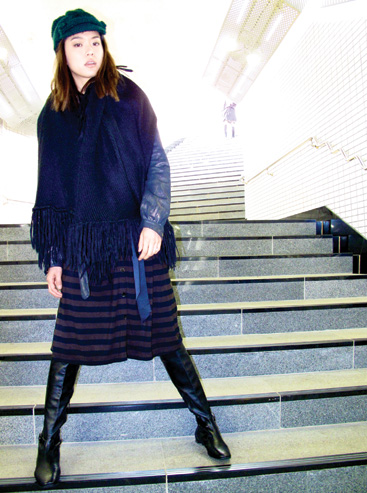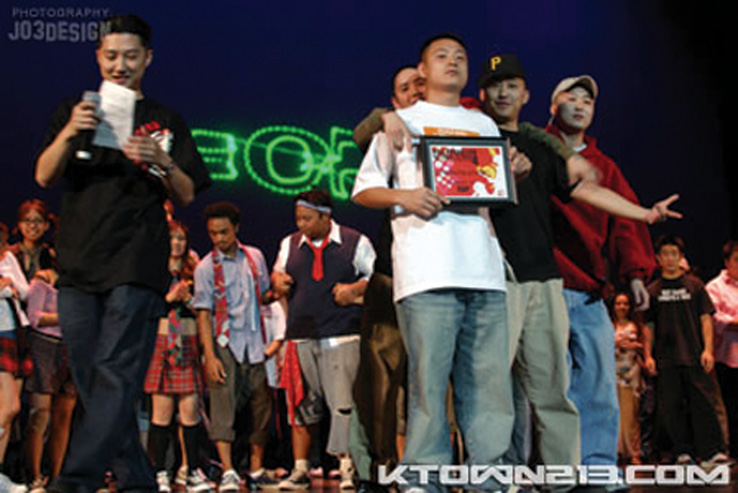By Oliver Saria
Photographs by Dean Foreman
Fans of the sci-fi cult hit Battlestar Galactica might recognize the above subtitle as a reference to the show’s opening sequence, when viewers are reminded that the Cylons—a race of cybernetic clones hell-bent on human genocide—have always had a plan. It’s ironic then that Grace Park—who will forever be remembered as Sharon/Athena/Boomer/Eight or, to the casual observer, “The Asian Cylon”—has never really had one.
When she booked her first series gig 10 years ago, she was merely happy to be working. The show was Edgemont, a 2001-2005 teen drama on the CBC (Canadian Broadcasting Corporation) that also launched the career of Kristin Kreuk of Smallville fame. Grace’s role as Shannon Ng was noteworthy for being the first depiction of an Asian teenage lesbian in North American television. (Yeah, Grace laughs at the specificity of it, too.) At that point in her acting career, she had no 10-year plan or five-year plan, or for that matter, a one-year plan; she didn’t write her hopes and dreams on pieces of paper to manifest them into reality or other ridiculous success strategies designed to foster hope in a brutal industry that usually crushes them. Yet, when Kristin booked CW’s Smallville and became a spokeswoman for Neutrogena, in the back of Grace’s mind, she knew stardom would also come her way.
Flash-forward 10 years. Grace recently concluded an acclaimed run on Syfy’s Battlestar Galactica, a show, hailed by critics as one of the best television series of the past decade, that aired from 2003-2009. She starred opposite John Cho in Michael Kang’s 2007 indie thriller, West 32nd. She appeared on The Border, a popular CBC action drama, now three seasons in, about an elite Canadian Immigration and Customs Security Unit. And Edgemont is finally being syndicated in the United States, to the delight of countless Asian teenage lesbians.
You’d think with the dawn of a new decade, the Los Angeles-born Canadian would want to reflect on the past like everybody else. But the thought never even occurred to her. “I don’t really think I’ve been reflective. I just more feel like I’m looking forward to what I’d like to do this year,” she proclaims.
Since Grace didn’t want to dwell on the past, I decided to walk her through it.
In previous interviews, Grace, who lives in Vancouver, asserts that she didn’t become an actress for the fame or glamour. And it wasn’t about the money either. Then (as now), she’d always been driven by the desire to excel at what she does. She admits, however, “It was hard for me to act for a while because I knew I was getting these great opportunities, but my work was not where I wanted it to be.” Thus, the thought of Edgemont being seen by a whole new audience makes her cringe. “When something like Edgemont that you’ve done early on decides to come back out…I’m not going to be running out and watching any of my original work.”
She’s slightly prouder of the work she did in the final 10 episodes of Battlestar, which the influential entertainment blog, “Television Without Pity,” honored by naming Grace one of the Most Valuable Performers of 2009. And to think those final episodes might never have been filmed. The 2007 Writers Guild of America strike halted production of the series at a critical juncture. The last scenes that were shot prior to the strike were set on the charred, uninhabitable remains of Earth. At that point in the series, Grace was playing several versions of the Eighth humanoid Cylon model. In one iteration, she had betrayed the Cylons, pledged loyalty to the Colonial fleet as they wandered deep space in search of Earth, and married a human pilot with whom she had a mixed-race daughter. In another iteration, she played the sleeper Cylon agent responsible for the failed assassination attempt on the fleet’s admiral. She also portrayed various clones on the Cylon baseship.
With the strike looming, many on set knew that there were no guarantees the show would return. The sadness and despair on the actors’ faces during those scenes were genuine. Earth could have served as an ending to the series—albeit a sorely disappointing one. When production returned, Edward James Olmos, the cast’s patriarch, sat them down to watch the last few episodes they had completed thus far. Grace’s reaction to her performance was scathing to say the least. “Really?” she thought. “Is that the last thing I shot? Is that all? Is that where I’m at? This sucks. Not that my stuff was necessarily bad, but I guess I just had higher hopes. So I was at the point where I felt like—alright, I’m all in.” Her bet paid off. “Television Without Pity” wrote of her work: “Park’s character had the most impressive range, from a woman being judged for her mixed marriage (Cylon & human) to clones wanting more out of their life to awesome pilot. Although she was often overlooked in favor of Starbuck and Six, her final few episodes were emotional and tearjerkingly wonderful.”
That same fearless approach to acting persists to this day and you can see the subtle differences in subsequent roles in The Border and The Cleaner (A&E). For the former, she played Homeland Security Agent Liz Carver and for the latter, edgy but big-hearted Akani Cuesta, part of an unconventional team of “extreme interventionists” that steers addicts toward recovery; though neither project gave her the same range of emotions as Battlestar, she comes across as an actress fully in command of her craft and a woman more comfortable in her shell.
And let’s talk about that shell for a moment, shall we? Chosen as one of FHM magazine’s “100 Sexiest Women in the World” and one of Maxim magazine’s “Hot 100,” Grace easily looks 10 years younger than her actual age (35, thank you very much.) Chalk it up to the whole Asian thing, but she credits the mass quantities of green food nutritional supplements that she pounds on a daily basis for keeping her ageless and fit. Apparently, the stuff looks like swamp water and according to her husband, smells like “low tide.” Whatever it is, it’s working. But you wouldn’t necessarily know that from the characters she portrays; they are never vixens vamping for the camera, but rather, complex women whose beauty is enhanced by their strength; the sex appeal is muted, yet unmistakable. That is until she smolders on the cover of Maxim or poses for some racy pictorial or films a steamy-yet-tasteful love scene, that you’re reminded what an absolute stunner she is. Which leads one to wonder: How does the man married to Grace Park handle it when she unleashes all that sexy?
As far as her sex-symbol status goes, her husband seems unfazed. “He has a lot of trust in me,” Grace asserts. “If you didn’t trust your woman or were a little bit insecure or if you were a player, you know, all of those things would influence you to perhaps be more possessive. It’s been a lot easier to be an actor with those characteristics in a husband, for sure.”
In an industry where celebs abdicate privacy and much as journalists invade it, Grace is refreshingly reticent about her marriage. Despite my prodding for intimate details about their courtship, she mostly stuck to the generalities. She’s been married since 2004 to Phil Kim, a Korea-born real estate developer who grew up in British Columbia. Surprised? (Not so much by the Canadian part, but by the fact that he’s Korean?) Well, Grace admits, “It was a surprise to me, too. Of course there are things we have in common so it’s a lot easier. It was actually a teeny bit negative just because my dad and just certain things. It was like, dude, I do not want to have to deal with this bullshit for the rest of my life.” So it probably helped that Phil wasn’t exactly hardcore Korean. According to Grace, between the two of them, they can count their close Korean friends on one hand. And despite being born in Korea, Phil tends to make up his own words. “He likes to say that he knows better Korean than me. And he says these really weird words, but his mom grew up in the south. So I finally go, ‘Oh, okay, that’s just how they say it.’ And then we’d be talking to either his mom or my mom or dad, and they’d say, ‘No, what is that?’ The words he makes up are just crap.”
Not that Grace and Phil have totally assimilated either. She did wear a hanbok for her pebaek in Vancouver, though no dates or chestnuts were thrown. And when she was developing her Cylon character, it was Phil who’d planted the cultural parallels. “I had a hard time just being the villain,” Grace explains. (Cylons, it should be known, were actually created by humans and enslaved until they rose up against their creators.) “My husband had said back when we were dating, ‘Oh, it’s easy. It’s just like you’re an oppressed race.’ And that just really opened my eyes because Koreans have been oppressed in the past—not in Canada—but, you know, with the history of Japan and Korea. I took whatever I knew from stories I had heard from my cousins growing up and I applied that. And then all of a sudden, I felt totally rooted and grounded in what I was doing. I just felt like I really had something to stand for and I felt the fight. Koreans love to fight too, right?”
So are there plans for Grace and Phil to start their own brood of fighting, Korean Canucks? According to her, she’s open to it, but like many, her plans for motherhood are vague.
Given Grace’s success, it comes as a bit of a shock to hear that she’s contemplating leaving the profession. After a relatively short time in the industry, she has reached a particular crossroad. “Before, I was just so hungry to prove myself,” she muses. “I wanted to achieve something because I had tied my self-worth way too much to this industry and my success. It was both good and bad for my work. So now that I feel like I’ve kinda separated the two, I don’t have to act and book certain gigs and get bigger jobs. I don’t have to prove anything. No, actually I lie. A part of me still wants to do that. But I’m not 100 percent rooted in that anymore. I feel more open to exploring different things.”
Exactly what things, you might ask? The list (half-jokingly) includes: busking on the streets of Paris, attending silent meditation retreats, living in a shack on a deserted island, waiting for a flight at some weird airport in some random little city, and perhaps having kids. But the list also includes more acting classes and expanding her résumé to include a producer credit. She’s currently attached to produce and star in the indie film Deadmonton, which centers on Asian street culture in Edmonton, Canada, which has the highest rate of gang-related murders in the country. As far as other opportunities on the horizon are concerned, she says, “There’s a ton of projects out there, but why would I want to do something so excessively violent or why would I want to do something that represents women in that way?” She acknowledges that her agent and manager are often exasperated by her. But if a project doesn’t offer her a significant challenge or a new experience, if it isn’t something she really believes in, she’s not interested in doing it. Like her beauty, her convictions are also deceptively fierce.
It might sound like Grace Park doesn’t have a plan, but after talking with her you get the sense that she knows exactly what she’s doing.









